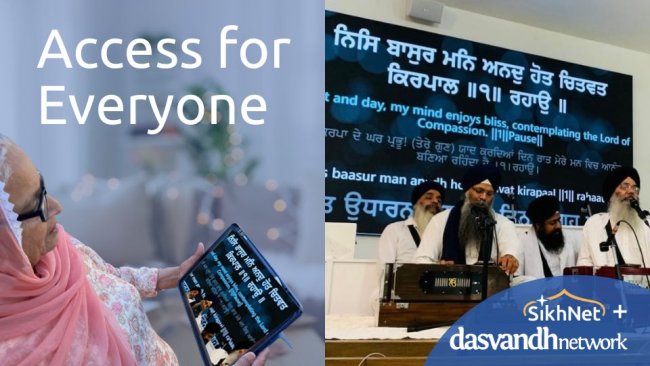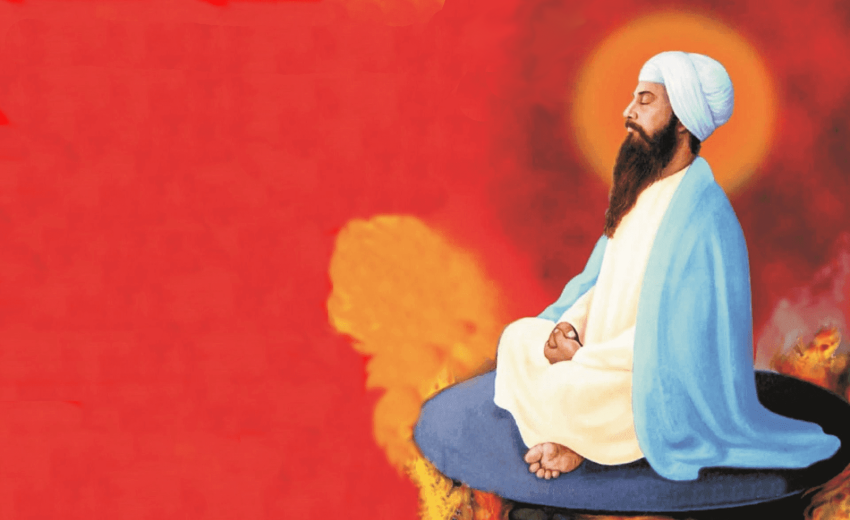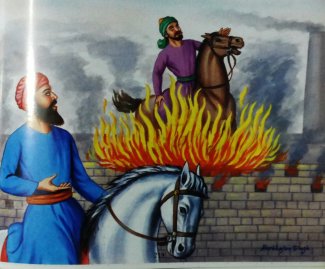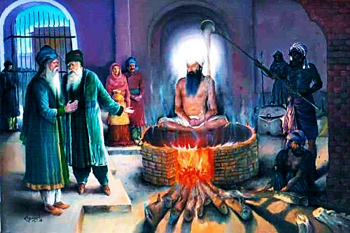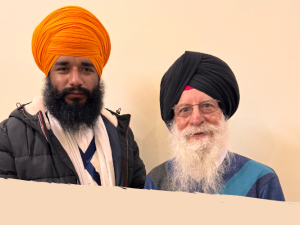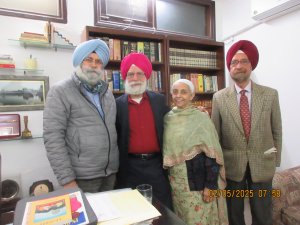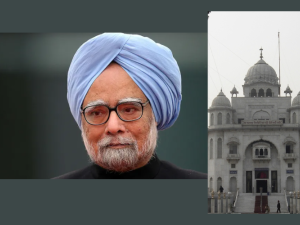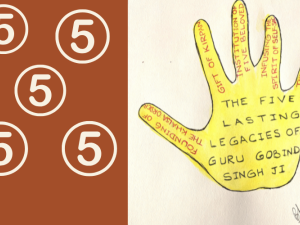The sacrifice of Guru Arjan Dev Ji is unparalleled, as he gave the supreme sacrifice of his own life, without even worrying about it. Such a supreme and noble task, only the soul that has scaled to highest heights can do it. For, the less evolved soul will waver in their determination on matter of life, and look for options to save it. After all, life is dear to everyone – a very human instinct. Yet Guru Ji sacrificed his body, as he was quite clear in his understanding that body is perishable. Guru Ji was also clear about what is not perishable - soul. Guru Arjan Dev Ji has shared this thought process with us in these words:
“Nanak badhaa ghar tahaa(n) jithai mirat na janam jaraa.4.6.76.” (SGGS, Pg. No. 44)
Translation: Nanak builds his house upon that site where there is no death, no birth, and no old age.
How, Guru Ji did acquire this thought process? Guru Ji provides the answer in his words as:
“Jau kirapaa gobind bhaee. Sukh sa(n)pat har naam fal paae satigur milaee.1. Rahaau.” (SGGS, Pg. No. 402)
Translation: When the Lord of the Universe became merciful, I met the True Guru. I found bliss, spiritual wealth and the fruit of the Lord's Naam.
Here Guru Ji shared with us that with Lord’s grace he met the True Guru. From the True Guru he obtained the wealth of Naam. The result was experiencing spiritual bliss. How that Naam transformed the inner-self of Guru Ji, is portrayed by Bhat Mathura in these words:
“Param ateet paramesur kai ra(n)g ra(n)gayeau baasanaa te baahar pai dhekheeat dhaam siau.” (SGGS, Pg. No. 1408)
Translation: He is supremely unattached, and imbued with the Love of the Transcendent Lord; he is free of desire, but he lives as a family man.
Bhat Mathura says that although Guru Ji is a family man, yet he possesses the following qualities:
- Totally unattached to any worldly possessions and the body
- Completely and lovingly merged in soul (to Lord through it)
- Free of all desires (of fame, wealth, status in the society etc.)
It is this mental state alone, free of all desires, that enables a person the courage to willing sacrifice the life. There is clarity of thought that the body is perishable, but soul does not perish. Because, the soul is merged with Lord while alive, so it is not ever going to die. But for us this is merely external information, and not real internal experience. The physical house where the body resides is subject to death, birth and old age. It is the soul alone, where these three things cannot come to pass. No wonder, Guru Ji at the time of his martyrdom Guru Ji was singing these words from his own composition:
“ਤੇਰਾ ਕੀਓਾ ਮੀਠਾ ਲਾਗੈ ]”
“Teraa keeaa meettaa laagai.” (SGGS, Pg. No. 394)
Translation: Your will is ever sweet to me; O Lord!
Guru Ji accepted the challenge as Divine Will. Now, let us see if we can find historical cum autobiographical evidence of that state of mind. Let us look at two incidents from Guru Ji’s life that took place after the birth of his only son Har Gobind Ji, who later became next Guru after Guru Arjan Dev Ji. The jealousy in Prithi Chand, the eldest brother of Guru Arjan Dev Ji at being by-passed for Guruship had created a new urgency in him, as the concern was that even his own child Meharban will not inherit the Guruship. So he was always plotting to get child Har Gobind and Guru Arjan Dev Ji eliminated.
Prithi Chand complained to Sulhi Khan, the revenue officer; who was visiting “Ha-Hery” village, that he had been denied his rightful inheritance of Guruship, by his father Guru Ram Das. Sulhi Khan responded that he was too busy with his assignments to help him, but recommended to seek the help of his nephew Sulbi Khan, who was an officer in the Mughal army. Prithi Chand got a written note from Sulhi and personally delivered it to Sulbi. Sulbi Khan saw this as an opportunity to loot Amritsar. Sulbi Khan and his forces marched towards Amritsar. At night, they camped on the banks of the river Beas. There, Syed Hassan Ali, who was an ex-soldier of the Mughal army, came to visit Sulbi Khan. Hassan Ali said that he was ex-soldier in the royal army before he quit, and that the state owed him back wages for two years. Sulbi Khan refused any knowledge of arrears and said he cannot pay him back wages. But Hassan Ali persisted, and a heated argument ensued between them. Sulbi Khan said, “I have no knowledge of the arrears of pay. All your pending dues will be given to you on my return to Lahore after due verifications.” Still Hassan Ali insisted on arrears being settled right away, so the situation quickly escalated, with Sulbi Khan becoming angry and cursing. This infuriated Hassan Ali who quickly drew out his sword, and a sword fight ensued. Hassan Ali swung his sword and with one fast blow, he beheaded Sulbi Khan. Then Hassan Ali quickly jumped into the Beas River to escape. Seeing the whole spectacle unfold right in front of his own eyes, Prithi Chand ran away for his own safety.
In contrast, when Guru Arjan Dev Ji was informed about Sulbi Khan’s advancing attack on him, he was unperturbed, and reposed his full faith in the Almighty, by sharing these words of Guru Ram Das:
“Mai har bin tek dhar avar na kaae'ee too kartae raakh mai nimaaNee hae.13.” (SGGS, Pg. No. 1070)
Translation: I have no other Support at all, except the Lord. O Creator Lord, please save me, meek and humble.
Guru Ji had reposed complete faith in Almighty. But when Sulhi Khan was informed about the incident, he decided to take matters in his own hands and take revenge for the death of his nephew. Because of drought in the state of Punjab, the revenue collection had been low, so he used that as a pretext to attack. His ruse was to collect back taxes. Guru Ji was informed about the impending attack and was asked to seek the royal intervention, to ward off the attack. Guru Ji has recorded the suggestions of the informers and well-wishers from Lahore in his own words as:
“ਪ੍ਰਥਮੇ ਮਤਾ ਜਿ ਪਤ੍ਰੀ ਚਲਾਵਉ ] ਦੁਤੀਏ ਮਤਾ ਦੁਇ ਮਾਨੁਖ ਪਹੁਚਾਵਉ ]
ਤ੍ਰਿਤੀਏ ਮਤਾ ਕਿਛੁ ਕਰਉ ਉਪਾਇਓਾ ]”
“Prathhamae muthaa j pat-ree chalaavo. Dutheeeae muthaa dhue maanukh pahuchaavo. Thritheeeae mathaa kishh karo oupaaeiaa.” (SGGS, Pg. No. 371)
Translation: First, they advised me to send a letter (explaining the facts). Second, they advised me to send two men (delegation to personally provide the facts instead of a letter). Third, they advised me to make some effort and do something (meaning to prepare for the onslaught and don’t take it lightly or leave it to fate).
The first and second suggestions were diplomatic initiatives. The third suggestion was a counter measure for defense. Guru Ji’s response was leaving aside all the proposed measures, to embrace faith in these words:
“ਮੈ ਸਭੁ ਕਿਛੁ ਛੋਡਿ ਪ੍ਰਭ ਤੁਹੀ ਧਿਓਾਇਓਾ ]”
“Mai sabh kishh shhodd prabh thuhee dhhiaaeiaa .” (SGGS, Pg. No. 371)
Translation: But I have renounced everything, and I meditate only on You, God.
On their march towards Amritsar, Sulhi Khan and his forces stopped for a night at “Ha-Hery” where Prithi Chand again hosted them. Prithi Chand took him for a hunting expedition and on return they stopped by at Prithi Chand’s brick kiln for a visit. Sulhi Khan decided to take the tour riding his prized horse. While on the tour, the horse got startled by the raging fire of the kiln and lost control. The horse, along with the rider Sulhi Khan fell into the burning kiln. The evil designs of Sulhi Khan were burnt along with him in the kiln. Thus, the holy city of Amritsar providentially escaped unscathed the painful experience of loot and plunder as contemplated by the deceased Sulhi. Guru Arjan Dev Ji heard the news of the tragic demise of Sulhi Khan and thanked Almighty in these words:
“Sulhi tae naaraaein raakh. Sulhi kaa haathh kahee na pahuchai sulhi hoe mooaa naapaak.” (SGGS, Pg. No. 825)
Translation: The Lord saved me from Sulhi Khan. Sulhi did not succeed in his plot, and he died in disgrace.
For a Muslim, the final resting of the body after death is by burial and not in cremation. Here we see that Sulhi Khan was burnt alive in a kiln. This death is truly an ignominious for the person with abominable motives. Despite the animosity of Prithi Chand and his attempts on lives of child Hargobind, and also Guru Ji, he always wished wellbeing of his elder brother. He even offered prayers to Almighty for welfare of his brother in these words:
“ਰਾਖਿ ਲੈਹੁ ਭਾਈ ਮੇਰੇ ਕਉ ਪ੍ਰਭ ਓਾਗੈ ਓਰਦਾਸਿ ]”
“Raakh laihau bhaae'ee mere kau prabh aagai aradhaas.” (SGGS, Pg. No. 619)
Translation: Please, save my brother, O my Beloved! I offer this prayer to my God.
Thus we can see that Guru Ji’s soul was fully and completely merged in Lord. He had full faith in God, and even for those who were totally bent on destroying his life, he had compassion and no grudge. The soul that has ascended to those heights, they do not cling to body life. Guru Ji’s martyrdom is example of crest of soul development, and inspiration for our soul’s journey. Bhai Gurdaas has aptly summed the sacrifice in these words:
“ਗੁਰ ਓਰਜਨ ਵਿਟਹੁ ਕੁਰਬਾਣੀ ]23]”
“Gur arajan viTahu kurabaanee.23. (Bhai Gurdaas, Vaar 24.23)
Translation: I am willing to sacrifice myself for Guru Arjan Dev (who carries out such elevated deeds).
